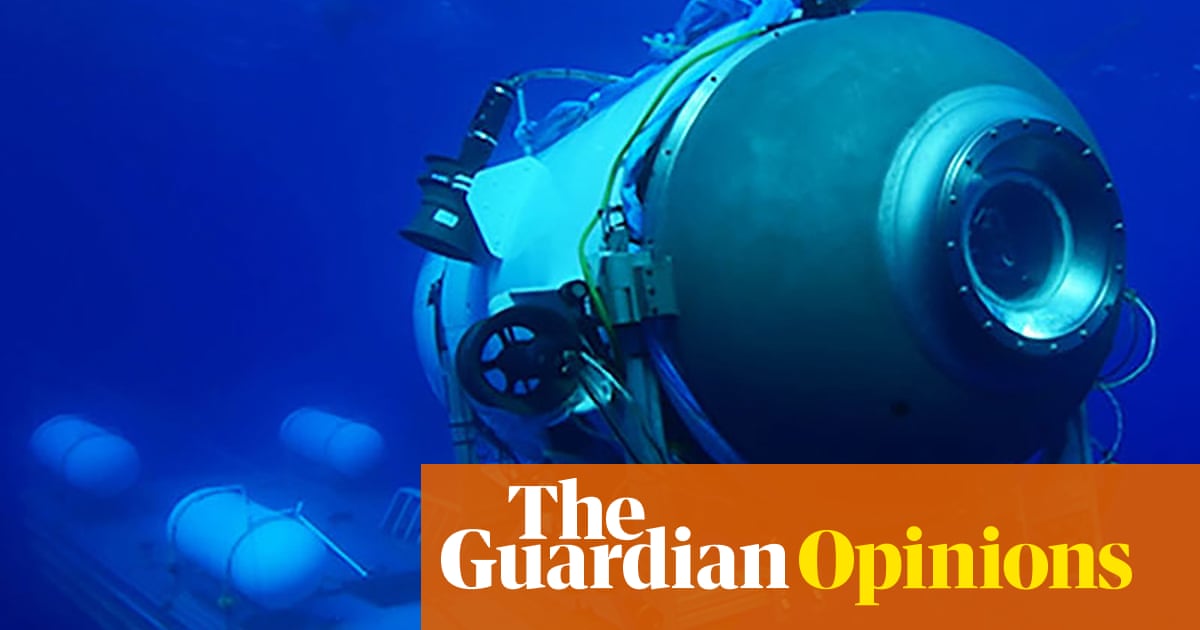
Finally, we know. The discovery of debris on the seafloor – confirming that the missing OceanGate Titan submersible probably disintegrated in an instantaneous implosion on the same day that it disappeared – brings to a bleak end the mystery that has horrified and mesmerised people across the globe.
The plight of the five passengers – the British adventurer Hamish Harding, the businessman Shahzada Dawood and his teenage son Suleman, the French veteran explorer Paul-Henri Nargeolet and OceanGate’s CEO, Stockton Rush – has dominated front pages everywhere and spurred an international response that involved four countries and may have cost millions of dollars.
It is impossible not to compare this reaction to the paltry response and perfunctory press coverage given to the sinking of a fishing boat last week in the Mediterranean. There were an estimated 750 people on board. Only about 100 survived.
The stark disparity in media and public interest between the two disasters could be all too easily attributed to the ways in which certain lives – particularly those of desperate asylum seekers – are accorded lesser value in the west. Many see the markedly different reactions as damning evidence of moral inconsistency and hypocrisy.
This may be part of the story. But was it really an overabundance of concern or sympathy that kept millions of us glued to the coverage, making it the most-read story on many major news sites for days, even amid a mortgage meltdown and inflation crisis? It’s hard to imagine that if the same five men had disappeared on a trek in the Andes, their rescue would have generated the same level of interest.
Beneath the ostensible fears for the wellbeing of the Titan’s passengers lurked another, uglier emotion: excitement. It was evident in the myriad gleeful tweets mocking the irony that a vessel seeking the Titanic might have succumbed to a similar fate. It was evident in the grotesque live countdowns of the assumed dwindling supply of oxygen in the sub. It was evident in the churn of ghoulish tabloid articles feverishly speculating about what might have happened to those aboard and the torment they would surely be going through. “Gradual suffocation, panic attacks and hypothermia: the chilling health consequences of being trapped in a submarine …” screamed one MailOnline headline. We can now be confident that, mercifully, the Titan five never suffered such a fate, but can only imagine the anguish that such speculation might have caused their friends and families.
It was evident, too, in the focus on the wealth of the men and the sums they must have stumped up for the expedition (about £200,000). Far from making their situation more pitiable, their riches seemed only to lessen the empathy and assuage the guilt of those gripped by the story: it confirmed a sense that these people were not like us.
Tales of hubris, arrogance and man’s fragility in the face of nature continue to fascinate and, yes, entertain us. The Titanic itself is not the greatest shipwreck disaster in recent history in terms of lives lost, but more than a century after its sinking, it still looms large in the popular psyche. Its story resonates with Greek tragedy: ambition and achievement being outperformed by unforgiving forces beyond human control.
There were, of course, elements of hubris in the fate of the Titan. Rush had claimed in a 2017 interview with CBS that the carbon fibre sub model was “pretty much invulnerable”. Some of the more playful elements of the sub’s design, from the Camping World lighting to the game console controls, seemed to suggest, for many, an unserious approach to exploration; the inhospitable corners of the world seen as playgrounds for wealthy, enterprising men, rather than immense wonders to be respected and feared.
On the stage of a global media event, the five passengers of the Titan became characters in a tragic drama and we the spectators. That they were sons, husbands, fathers and brothers; that most of them were dedicated and experienced explorers; that one of them had not yet turned 20: all these things got somewhat lost in the spectacle.
Some commentators found the Titan voyagers’ attraction to the Titanic’s remains morbid and distasteful. “It is high time we left the ship and her dead to rest,” wrote the journalist Julie Cook, whose great-grandfather died on the Titanic.
But the passengers’ fascination with the Titanic grave site has only been mirrored by our own enthralment with the submersible’s fate.
-
Bryony Clarke is an assistant letters editor at the Guardian
-
Do you have an opinion on the issues raised in this article? If you would like to submit a response of up to 300 words by email to be considered for publication in our letters section, please click here.
"story" - Google News
June 23, 2023 at 07:06PM
https://ift.tt/HtxuyLS
We were afraid for the Titan five. But this story generated an uglier emotion, too: excitement - The Guardian
"story" - Google News
https://ift.tt/78WLmYt
https://ift.tt/5Y7CiaX
Bagikan Berita Ini














0 Response to "We were afraid for the Titan five. But this story generated an uglier emotion too: excitement - The Guardian"
Post a Comment